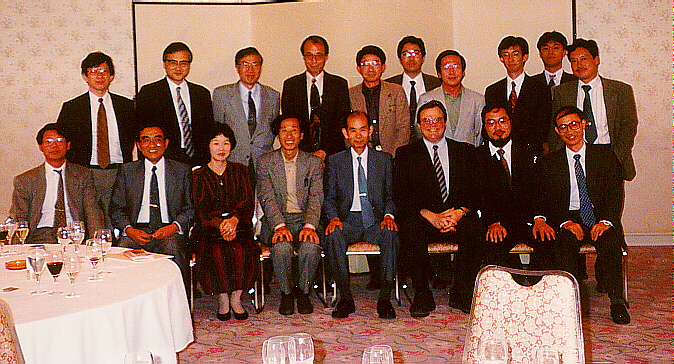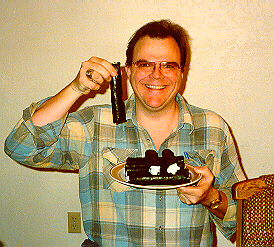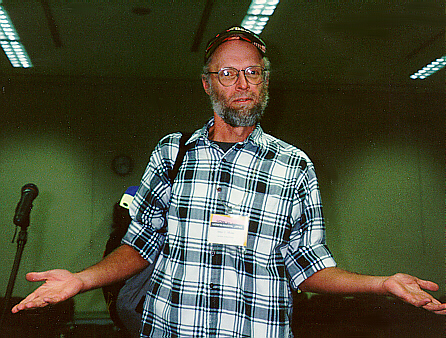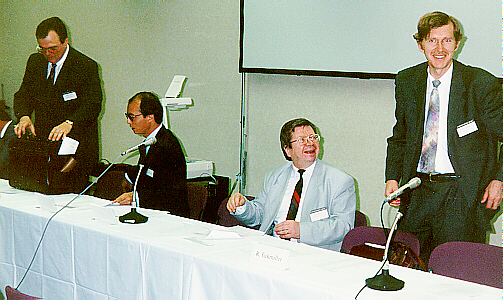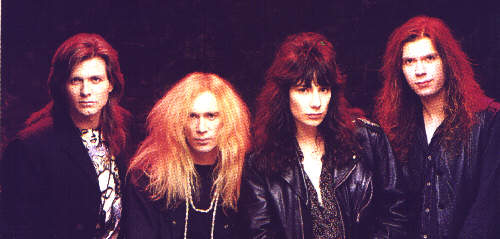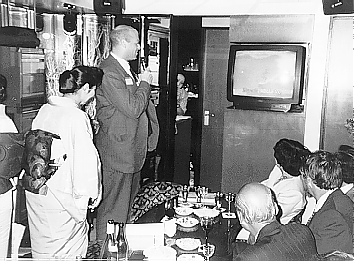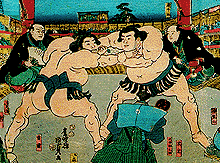
|
When Sumos Fly Robert J. Marks II Fish &
Eggs: Raw Raw Raw!
It hit me clearly for the first time that Japan was truly different from America. The traditional Japanese breakfast was placed before me. Fish and eggs - both raw. Then there were the other things. Russ Eberhart, the Vice President of the IEEE Neural Networks Council (NNC), and I, the President, were in Tokyo to settle a problem caused by a Japanese-American cultural misunderstanding. The NNC was sponsoring a major conference in Japan (The International Joint Conference on Neural Networks). We had approached the problem in an American way. A highly visible, energetic internationally visible hot shot was chosen to be the Chair of the conference. The person we chose, Toshio Fukuda, was the youngest person to ever be appointed the rank of full Professor at an imperial university in Japan. Toshio is a continuing explosion of creative and political energy. He is also politically and socially savvy. Toshio claims that, to westerners, the faces of Japanese men look younger than their true years. He thus sports a full jet black beard to make him look older. Toshio travels to the United States numerous times each year. He has three homes. One is in Tokyo where his wife and children live. The second is in Nagoya near his University. The third is aboard Northwest Airlines. Choosing a young energetic ball of fire like Toshio to lead a major event is not the way things are done in Japan. There, all the people working in the field of the conference are lined up and their wrinkles counted. The one with the most wins. When young Toshio is named, we hear loudly from Professor Sun- Ichi Amariís subordinates. Amari is the most senior researcher in neural networks in Japan. (His work is also outstanding.) It is highly improper and undignified for the Dr. Amari to express his outrage at the support of Fukuda directly. His pawns serve this purpose. We are told in no uncertain terms: if Amari hexes the conference, the important researchers in Japan will not attend. The conference will be a failure. This is the problem Russ and I face. Jet lag wakes me well before sunrise. We are staying at the Ginza Da Ichi hotel in the Ginza district of Tokyo. The cost is $180 per night for a room smaller than a Motel 8 - for that matter a Motel 2. The room is hot and muggy. There is no air conditioning and I canít figure how to open the window or operate the telephone. Slippers and a housecoat are provided.. There is also this two foot long shoe horn. Every Japanese hotel I ever stayed at has a two foot long shoe horn. They are great. You can use them without bending over thereby reserving the cardinality of your quota. Our pre-meeting breakfast is in a small private meeting room in a cute Tokyo restaurant. Russ said I sit at the head of the table to establish that I, as the NNC President, am the big bean curd. We hang the NNC banner behind me. Russ says there are Japanese cultural reasons behind doing this and our guests will be impressed. In they come - Toshio, Dr. Amari and all Amariís lieutenants. The greetings are very un-American. Americans would be formal, apprehensive, stuffy and all business. These guys smile big toothy grins, say greetings with thick accents and voices that go up and down the tone scale. Their heads and upper torsos bob up and down like members of an unsynchronized aerobics class. The deeper you bow, the more respect shown. The young guys bump their noses on the floor. Russ and I try to emulate the custom - except , with my full boned body, I do not bend well. I bow as low as I can without audible grunting. Russ said our hosts would be impressed if we ate a traditional Japanese breakfast. They are indeed impressed and even say so. The food doesnít taste that bad. The raw eggs and raw fish are simply hard to look at. As a famous wart hog in Disneyís Lion King said, "Slimy but satisfying!". Discussion starts. With a big hospitable grin, I say the conference should be in Nagoya with young Toshio Fukuda as the Chair. Toshio has been appointed by the sponsoring organization and was well qualified for the position. Russ looks at me, smiles, bobs his head in approval and looks around the table, smiles and bobs his head some more. Russ has read this was the proper thing to do. I also nod my head like an idiot when he and Toshio talk. I feel like a toy dog glued on the back dash of a `69 Mustang. Amari smiles, nods, and says `yesí. Their nods are not as enthusiastic as ours. But wait a minute! Hold your egg rolls! They said `yesí? Incredible. I could have made this brilliant fifty second oratory over the phone. Had we wasted a trip to Japan? No. I later learn that saying `noí in Japan is considered rude. When `yesí is said, it means the comment is understood. You could say "Youíre so ugly, your mother had to rub raw squid on your face so the dog would play with you" and they would smile, bob their heads, and say `Yes, yesí. This didnít mean that they agree. It meant they had heard what you said and, `yesí, your opinion was understood. Amari says he understands, but the conference would be better if held in Tokyo. All his flunkies smile like this was the greatest thing they ever heard and start with the enthusiastic head bobbing. The implication is that Amari, being the senior neural networks guy from Tokyo, would be the top soy bean. Toshio, from Nagoya, wants the conference in Nagoya. We end the meeting all smiles, saying `yes, yesí, we understand the other guyís position. The only consensus we have is this was a Japanese problem and needed to be solved by the Japanese. In other words, Toshio and Amari have to meet and work things out. They did. The conference was held in Nagoya with Amari as Chair. Toshio was the `Steering Committee Chairí which is like the head person - but not really. I donít know if itís a Japanese saying, but should be. `To save face and solve conflicts, obfuscate.í
Some of the organization committee at the 1993 Nagoya IJCNN. Can you find the round-eyes?
Big Foot Sighted in Tokyo That afternoon, our host, Toshio Fukuda, takes us on the town in Tokyo. Our first stop is a restaurant for lunch. Traditionally, shoes are removed and placed in a secured cubby hole before the dining room is entered. The Japanese apparently have a thing about shoes and cleanliness. At the restaurant, I dutifully remove my shoes and am relieved to note that (a) my socks contain no holes and (b) match. The hostess takes my shoes, says something in Japanese, and bows. She places them in the shoe cubby and tries to close and lock the door. The problem is that I wear a size 13EE. The door to my shoe cubby does not close. She begins a more high pitched and animated monologue in Japanese as she bends the toes of my shoes and forces the door to close. She turns, starts bowing at me and keeps babbling. Toshio translates. "She is saying ĎI am so very sorry. Please forgive me. This is all my fault. I am so sorry.í " Russ laughs. It really is not that big of a deal. For lunch, we sit cross legged on the floor in front of a low table. The heals of my feet totally overhang the back of the slippers provided by the restaurant. In truth, I love Japanese food. I am fond of sushi bars and go often with my son, Jeremiah. The rest of my family stays home. I once tried to make sushi at home. I got some green sheets of seaweed from Safeway and placed them flat on the chopping block. Freshly cooked sticky rice was placed on top. When I smoked, I occasionally rolled my own cigarettes. Making sushi, I reasoned, couldnít be that much different. I was afraid of using raw fish purchased at Safeway for my sushi, so I bought a couple cans of cooked sardines - packed in fresh spring water. My sushi, for some reason, was about three times the diameter of normal sushi. Because I used warm rice, the seaweed became rubbery. Not even Jeremiah liked it. I ended up eating it all as a matter of pride. I donít make sushi anymore.
I explained to one of Toshioís students the dislike of sushi by some Americans. Were there any American foods that repulsed Japanese? His response was immediate. "Cheese" For some reason, he was repulsed by the idea of eating the waste discharge of milk eating bacteria. In the evening after the nonconfrontational confrontation, Russ, Toshio and I go to a classy Japanese restaurant and eat shabu-shabu. Shabu-shabu - what a great Japanese word! It could be used everywhere. You bump into someone accidentally. You turn, smile apologetically, bow and say `shabu-shabuí. When you put grandma on the plane, you wave as she walks down the ramp. When she turns for that last eye contact, you energize the waving and yell `shabu-shabuí. The phone rings. You answer with a friendly `shabu-shabu.í Here is what it really means. A boiling pot of water is placed in the middle of the table on sterno fire. Using chop sticks, thinly sliced pieces of beef are dipped into the bubbling water. Once cooked, the beef is dipped into a yummy sauce and eaten. After a lot of beef is cooked, the water becomes a tasty broth. The waiter brings vegetables and other goodies and makes soup. It is very good. Dessert was green tea ice cream. I know the place is classy because Toshio pays over $1000 (in yen) for the three of us. The meal is the most expensive I have ever eaten. Shabu-shabu. Conversation over dinner is a wonderfully pleasent international passtime. I ask Toshio a question most westerners (like me) canít answer but often ponder. Can a Japanese person look at a Chinese person and tell by appearance the man is Chinese? Or Korean? I canít tell the difference. Toshioís explanantion is great. "Can you tell the difference between a Swede and a German?" I tell him "Sometimes". "Same thing," he says. "When they speak, though, I know their nationality immediately." "Same thing with the Swede and the German," says I. "Exactly. You know," he smiles. "You Europeans all look the same to me." The Conception of FUZZ-IEEE Japan is the birthplace of fuzzy logic applications. The discipline has lived controversially in western journal papers since 1965 when American Lotfi Zadeh published his seminal paper. The Japanese put this controversy to rest (at least for sensible people) by successfully applying fuzzy logic technology to items from rice cookers to bullet trains. Arguing with success is futile. I first hear of the Japanese technical revolution from Bernie Widrow, a pioneer in neural networks (e.g. the Widrow-Hoff algorithm) and former President of the International Neural Network Society. Bernie said the Japanese fuzzy technology was awesome and if we (the United States) didnít do anything, the Japanese would dominate the worldís business in fuzzy logic applications. Russ, Toshio and I discuss this during breakfast at the Ginza Da-Ichi Hotel lobby cafe in Tokyo. It is the morning after shabu-shabu night. I am the President of the IEEE Neural Networks Council, Russ is vice- president and Toshio is the Secretary. The NNC had recently started an NNC Forum Series where minor workshops could be sponsored by the NNC in areas related to neural networks. Russ has long favored having an NNC forum on fuzzy logic and neural networks. At that breakfast meeting, over green tea and tofu bean soup, we decide a major international fuzzy conference is needed. The IEEE Neural Networks Council will sponsor. But who will be the lead person and where will the conference be held? Toshio has done work in fuzzy systems and is well connected with the Japanese community. Toshio says, though, that the first conference should be held in the United States. Even though the Japanese are a formidable technical force, the United States still dominates the world in technical presence and status. Neither Russ nor I know enough about the topic or the major players to be top dog in the United States. The only NNC officer who isnít at the breakfast was the Treasurer, Patrick K. Simpson. Pat had done a lot of recent work in fuzzy systems. He had the drive and the knowledge to pull this off. It is settled. Patrick will be the first Chair of the IEEE International Conference on Fuzzy Systems. Russ, Toshio and I are excited! When I return to the States, I call Pat and tell him why he should be excited too. The problem was, after the high of the flattery faded and after Pat realizes he will be doing all the work, he decides to decline the offer. In retrospect, Patís decision is wise. The first Chair should be a well connected experienced fuzzy guy. Pat calls Jim Bezdek, an endowed Professor at the University of West Florida. Jim also used to work at the Boeing High Tech Center. None of us know him but he was quoted in a recent IEEE Spectrum article about fuzzy systems. To say that Bezdek was enthusiastic is like calling Einstein smart. He had approached other IEEE organizations about sponsoring a fuzzy conference and had gotten nowhere. All that was left was to tell Jim IEEE rules and get out of the way. Jim is well connected. He knows all the main fuzzy guys and gets them all to participate by convincing them this is their one chance to get a toe hold in the prestigious IEEE. Bezdek coins the phrase FUZZ-IEEE as shorthand for the IEEE International Conference on Fuzzy Systems. It is the best short title for a conference ever conceived. The first FUZZ-IEEE at the Town and Country in San Diego in 1992 was a monumental success. Four years earlier, the same location hosted the first of neural networksí biggest annual conference - the IEEE International Conference on Neural Networks (ICNN). Now, FUZZ-IEEE is the largest international conference on the topic. Toshio got his chance to Chair FUZZ-IEEE in Yokohama, Japan in 1995. It was the largest fuzzy conference ever held in Japan.
Jim Bezdek. Fuzzy guru Jim Bezdek went on to be the founding Editor of the IEEE Transactions on Fuzzy Systems. I first suggested the idea to him in a phone conversation. The IEEE ICNN conference sequence had spawned the IEEE Transactions on Neural Networks. It only made sense the successful FUZZ-IEEE conference should also spawn a journal. "You bet. Tell me what to do," was his response. I had been on the committee that drafted the proposal for the IEEE Transactions on Neural Networks. Herb Rauch, the founding TNN Editor, was the Chair. I sent Jim a copy of the documents, told him the hoops he had to jump through and got out of the way. The proposal went through IEEE flawlessly. The journal now has a circulation exceeding the combination of all other fuzzy journals. Bow Bow Black Sheep I learn more about Japanese business practices during my second visit there two years later in 1992. Business cards in Japan, for example, are necessary for formal introduction. There is a ceremony in their exchange. The junior guy goes first. He holds his card upside down with both hands at waist level in a half bow so the senior guy can read it. The senior guy accepts the card and examines it. It is proper that something be said concerning the card, like "So. You are the head tuna man at the Yokohama fish works." Placing the card in your wallet and then in your back pocket is an insult. You are, in essence, mooning the card. When seated, one good idea is to place the cards is the same geometry as those seated at the table. Remembering names no longer is a problem. After the senior guy properly accepts the card of junior, the roles in the ceremony are reversed. The ceremonial introduction is now complete. The first time this ceremony was appropriate for me was when meeting Isao Idota, the Executive Director of the Japan Technology Transfer Association. First, Idotaís lowest flunkies come in. All are dressed in thousand dollar suits and starched shirts. Most have apparently never experienced a bad hair day. We go through the ceremony, one at a time. Some do not speak English and have cards that are totally in Japanese. I smile until my dimples cramp, letting them know I think they are the neatest guys in the world since Hirihito. They smile back and bow like crazy. Finally, it is time for Idota. Since he is the senior samurai, I get my card ready, bow slightly, and ready myself for the ceremony. No way. Idota comes through the door with a brisk confident pace. His right hand is outstretched for a handshake as he says in a resonant enthusiastic booming voice "Bob Marks! Good to meet you!" Obviously, Idota was much better practiced in American customs than I was in Japanese. We have a Chinese dinner that night. There are a bunch of hot shots sitting around the dinner table. Besides Idota, Fukuda and me, Harold Szu, President of the International Neural Network Society (INNS) was there. (Szu is pronounced as in "A boy named Szu".) Dr. Szu is an American who works for the Navy. Professor Harashima, Dean of the college of engineering at Tokyo University and the mentor of Toshio Fukuda, is also there. Harashima is a pacifist of sorts. He proposes that Japanís wealth needs to be shared with surrounding third world countries. He also likes the fact that Japan has no army. It is prohibited, I believe, by provisions imposed at the end of World War II. We speak in generalities about the effect of Japan having no army or navy. In a very uncomfortable moment, Harashima, who until that time had been controlling himself, makes an in-your-face pronouncement. "The world does not want to see again what the Japanese soldier can do!" To put this statement in better context, an explanation of oral confrontation in Japan is needed. First, in- your-face phrases in Japan are typically growled rather than spoken. In many instances, the final word or phrase is raised both in pitch and intensity and abruptly cut off at the end.. Phrases are said quickly with pauses between. For example, in growl talk, an insult would be as follows. "I do not want to HURT you! I simply want to run you over with My SUBURU! And throw off Mount FUJI!" Read this again out loud and emphasize the capitalized words quickly using a growl voice. On the capitalized words, also attempt ejecting high velocity bits of spittle while leaning forward. Any incidental expectorant splats into your opponents face. Your point is made abruptly and effectively! Thatís oral Japanese confrontation. (If you desire further explanation, rent a subtitled Japanese action move, like "The Seven Samurai". Thereís a lot of great growl talk.) At the dinner table, Harashimaís comment, with emphasis, was more like; "The world does not want To SEE AGAIN! What the Japanese soldier Can DO!". A bit of spittle arcs over the table and lands in my shark fin soup. Very intimidating. The statement is followed by awkward silence. Russ Eberhart breaks the silence commenting that now is a good time to exchange gifts. Exchanging gifts in Japan is traditional. For some reason I donít understand, gifts should be given in odd numbers. I am rude at this meeting because zero is an even number. Dr. Szu presents Idota a fifth of American scotch. Russ is a bit more culturally clever. He knows many Japanese love baseball. Russ lives in North Carolina - home of the Durham Bulls. A Kevin Costner picture had been made about the Durham Bulls - the most financially successful in minor league baseball. Russ presents Idota with a Durham Bulls baseball. Idota loves it! He rolls in his hands, held it up, looked at it, and smiled. "This is really it, isnít it? This is really it!" Idota beams and rolls the ball some more admiring it like Wimpy with a hamburger. Russí present has resonated. Harashima doesnít speak much more at dinner. I donít eat my shark fin soup. How COULD You!?! On my third trip to Japan, Harashima and I have a polarizing debate about the dangers of America. We sit at a bar at the conference sight of the 1995 FUZZ-IEEE in Yokohama. Harashima has put away a few sakeís. I have chugged four warm club sodas. He is feeling the effects of the alcohol and I the pressure of carbonation. We are ready for a verbal spar. Harashima started. "I will never come to America again. It is Too DANGEROUS. How could you? When I was the Treasurer of IEEE, I came to America often. Now a Japanese boy is shot when he chooses a wrong house. How COULD you?! This would never happen in Japan. We have no guns. They are OUTlawed. There is no crime in the streets of TOKYO. EVER. How COULD you?!" He liked saying `How COULD you?!í. I am very supportive of an Americanís right to own hand guns. It goes with liberty and freedom. (You may not agree - but I bet you have just now abandoned any plans to break into my house.) The Japanese say they have no crime in their major cities because they outlaw guns. It probably has more to do with their homogeneous culture. The First Amendment was not written to protect the rights of target shooters and hunters. "Guns for peace!" I say! I lucidity explain to Harashima my philosophy in detail. He orders another sake and, due to my flawless logic, changes the subject. "Panama. How COULD you?! You invaded Panama, a sovereign country, to kidnap their leader. How COULD you?! How does Japan know you will not do this to Japan. This is bad. Very BAD." Harashima keeps looking down at his sake and shaking his head in sadness. Then he undertakes a monologue about Operation Desert Storm and how, again, the United States had invaded a sovereign nation. His solution is to give Iraq money. If you give someone enough money, they will become nonaggresive, he argues. This is how todayís Japan would respond, he says. Arguing with some people is like sweeping a dirt floor clean. This, I soon realized, was the case with Harashima. I excused myself. Even though I explained to him I did not invade Grenada, a few steps away, I hear him again mutter "How COULD you!?" I whimsically contemplate feigning violence. Possibly Harashima would then offer me a generous sum of money to go away. I recently learned that Harashima started traveling to the United States again. I believe his duties as Dean were the real reason he no longer traveled to the United States. Either that, or he gave further consideration to my lucid points and changed his political thinking. When sumos fly. The Nagoya IJCNN & the Standards of War The Nagoya IJCNN conference discussed with Amari over a traditional Japanese breakfast in 1990 became a reality in 1992. It is a great technical success - with over 800 attendees. I participate in a session on standards organized by the NNC. Standards are important. Imagine, for example, if there were no standard for electric wall sockets in the US. Use of electric appliances plugged into the wall would be one large connection headache. A hair dryer with a plug fit for the wall socket in your home may not work with the hotel socket of your hotel room. Fortunately, there is a United States standard for wall sockets and every manufacturer of things you plug in the wall knows how to design the electric plug. Other examples are numerous. The special panel session topic at the IJCNN conference was on the need for standards in the field of neural networks. Participants were Teovo Kohonen from Finland, Rolf Eckmiller from Germany. Yoshida Uchikawa from Japan and me. Yoshida, or Yoshi for short, was a good friend of Toshie Fukudaís. I encouraged them that if they ever failed in academia, they could open a string of teriyaki bars called ĎToshie and Yoshiísí.
A panel of standards. From left to right: me. Shiro Usui, Teuvo Kohonen and Rolf Eckmiller. Yoshi started the session out by stating that Japan had lost World War II because of lack of manufacturing standards. There are some uneasy chuckles from the audience. Airplane parts manufactured in one factory did not fit into those manufactured in another. Therefore, he concluded, standards were very important. Eckmiller the German stood. Rolf is a proper and tall with a quick wit and good posture. "Germany", he says spontaneously, "lost the war because of too strict of standards". He goes on to explain that too strict of standards can repress individuality and innovation. Now itís my turn. I am nervous. I want to proudly defend and represent America in this technical- turned-political discussion. My mind churns for bold sophisticated and clever words that will guilefully continue this theme. "Like the story of Goldilocks and the three bears, US standards were neither to loose or too strict. They were just right! Thatís why we won the war." I donít say that. "Japan did not loose World War II because of lack of technical standards. It had more to do with the astonishing fighting power of the Allied forces and the dropping of the atomic bomb". I donít say that either. "There are those who question whether the time is right to develop standards for neural networks. They say we should wait. We must ask, though, what more will we know in five or ten years about development of basic standards that we do not know now?" This is what I say. A golden opportunity lost for a true patriot. Pure wimp-out. Mr. Big Have you read Michael Crichtonís book Rising Sun? The book is pretty good - but the movie got a thumbs down from me. It contains a lot of Japan bashing. Iím not a believer in a Japanese conspiracy. I do think, though, there is a lot of national pride in Japan. Sometimes it manifests itself in American bashing. The conference banquet speaker at the Nagoya IJCNN does just that. He is the CEO of a Japanese company that manufactures tools. He claims the Japanese, in business, are like farmers. They look at projects in great detail and spend significant effort in perfection of precision. The Americans, on the other hand, are hunters. Americans are always on the lookout for new inventions and ideas. He illustrates the point with an application of their battery operated drill. "In Japan", he says, "we would never have innovatively conceived a use for our battery operated drill as clever as this." The lights dim, heavy metal music blares and two big screen televisions on both sides of the banquet hall dimly illuminate the audience. The picture is of a heavy metal American band named Mr. Big. The lead guitarist is operating a battery powered drill. Where the drill bit should have been, a circular array of guitar picks rotates. When the drill operates, the guitar picks pluck the guitar strings. The result is a flurry of fast short notes. It actually sounded pretty good. The audience, mostly Japanese, roars in laughter at this American innovation of Japanese technology. I thought it was a pretty clever idea. Japan is a Gas The International Conference on Fuzzy Systems (FUZZ-IEEE) is held in Yokohama in March 1995. Toshio Fukuda is again the guiding force behind the conference. Although this is the third FUZZ-IEEE, it is the first IEEE conference on fuzzy logic ever held in Japan - the country that pioneered fuzzy logic applications. It is also the largest technical fuzzy conference ever held in Japan. My train ride from Narita airport outside of Tokyo is uneventful except for two things. First, some Japanese whackos gas the subway from Tokyo and Yokohama killing some and injuring a lot. This is the same day I am traveling between Tokyo and Yokohama. My family in the US hears the news and is scared. There are seven notes waiting for me at the hotel asking if I am still alive. I call my wife Connie in the US and replayed the old Mark Twain comment, "Rumors of my death are greatly exaggerated." The second problem I encounter with my trip is getting off of the train one stop early. I walk about with all my luggage looking my role as a lost tourist. I am approached by a friendly Japanese man who asks where I was going. I showed him a flyer from the conference and he laughs. "You got off tlain to soon. No ploblem" (side bar: Japanese and Chinese have difficulty distinguishing between rís and lís. Thatís why youíll hear Oriental accent parodies with lís replaced by rís, like "Thatís reary rovery," and visa versa, like "Iíd like some flied lice in my loom." Americanís arenít much better though. Iíve had a Vietnemese student say six different Vietnamese words to me that all sounded like a short "a" and swear she had pronounced them all the same. Most languages apparently have blind sounds in other languages difficult to distinguish. Try saying the following quickly to someone - "In mud eels are. In clay none are." They will have no idea what you are saying. End of sidebar). The friendly Japanese man - I forget his name so letís call him Teriyaki - picks up my suitcase and motions for me to follow. He puts some coins in a train ticket vending machine and purchases passage for the both of us to the next train stop. Teriyaki insists on carrying my suitcase to the train and riding with me to the next stop. On the train, I smell his breath for the first time. He is drunk. Obviously, he is the type of drunk who becomes friendly when he drinks. We arrived at the proper stop and Teriyaki carries my bag to the hotel. "I buy you dlink" he offers. I say Iíd love a glass of mineral water - so my new friend and I are off to the hotel bar. I learn he is drinking to cover the sting of receiving his oldest sonís latest test scores. In Japan, students are given tests at various points in their matriculation. The outcomes determine life long vocations. If they flunk the first test, their career ceiling is, say, window washing. If the second test is failed, their careers are chosen to be at some higher level profession. Teriyakiís son had just flunked one of these tests and could not now go to college. Teriyaki has lost face due to this and is chugging sake to forget. He says Japan is bad. The houses are little, the tests are unfair and the government keeps everybody poor so the country can be financially prosperous. Here is a guy that needs cheering. I tell Teriyaki the old story about the best carnal life in the world. It includes French food, a Japanese wife, British law and an American home. The worst life is French government, a Japanese home, British food and an American wife. (An exception, of course, is my wife. I love you honey!) Teriyaki laughs hard and takes another swig of sake. We talk some more and part with a handshake and a few deep bows. Although I donít condone Teriyakiís drinking solution to purge problems, it beats the more traditional samurai solution. Karaoke Karaoke is the best thing Japan ever invented. Americans screwed it up. In America, you go into a bar and sing in front of a bunch of people you donít know. In Japan, its different. You rent a room with a karaoke machine. Only you and your friends go into the room. You can bring in your own drinks and munchies. Your sour notes are heard only by those you know. If you are only acquaintances when you start, you will be back-slapping friends after an evening of karaoke. There is no way two people can sing in front of each other for a couple of hours and not be good buddies. Karaoke, I am told, means "empty orchestra". It has the same root as karate which means "empty hand". At the Nagoya IJCNN conference, Toshio Fukuda invites all the organizing committee for the conference to a karaoke room. Its a whoís who in neural networks, including David Rumelhart, Sun-Ichi Amari, Robert Hecht-Nielsen, Shiru Usui, Fukushima and Teuvo Kohonen. Hecht-Nielson, president & founder of RHN (Robert Hecht- Nielson) Inc., the most visible of the neural network companies, begins with a monotone version of the Beach Boyís "Surfiní USA". Everyone howls. Robert does a mock bow. Every person in the room takes their turn except for one guy from the World Bank who was into neural networks and finance. He was right to do this. It would have totally blown his stuffed shirt image. Me? I did the Tokenís "The Lion Sleeps Tonight" complete with falsetto. For my highly demanded encore, I belted a rousing "House of the Rising Sun".
Robert Hecht-Nielson singing "Surfing USA". My most memorable karaoke experience was at the Yokohama FUZZ-IEEE. Toshio took seven people to a karaoke room. There was Toshio, Shibata (one of Toshioís students), two guys from Russia, a German, a Norwegian and me. In thick accents, the Russians did a spirited duet of the Beatleís "Back in the USSR". When they got to the line "those Moscow girls really knock me out," they rolled their eyes in mock passion. I split a gut laughing. We ended the evening exploring Yokohama like life long friends. Do you want harmonious diversity? An end to nationalism and racism? Karaoke may be the answer. Sianara As a boy, I knew only that America beat Japan in the second World War. The atomic bomb that ended the war probably saved the life of my Uncle Junior McHenry who would have been in the Allied invading forces. Harashima is right. The Japanese are fierce warriors. When I ask Toshio Fukuda about the war, he offers an animated shrug, an extended lower lip and the explanation "It wasnít my fault. I wasnít there!" I like todayís Japan. The people are directed, homogeneous and disciplined. I have a Japanese television, a Japanese video recorder, a fondness for Japanese food and a cat named Tokyo. I also have a number of good Japanese friends. Also, all of the bowing these last few years has made my abs tighter. Shabu-shabu.
|
